10 Oddest Rules In Wrestling
Most rules are made to be broken. These rules are ALREADY broken.
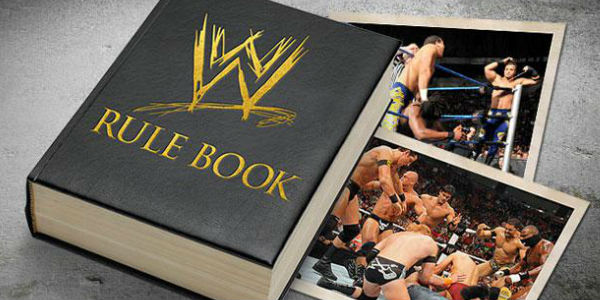
Let's be clear about this: professional wrestling only has the rules that it needs to have on any given night, at any given moment. After all, the business is a work, from top to bottom. Who competes where, when, against whom, and for what reason: everything's arranged in advance. You knew that, right? While there are some variations in different locations around the world (a few individual states in the USA still regulate pro wrestling under the same or similar rules to actual competitive sports), that includes the rules that matches are contested under. It's all a work, all created for the purposes of staging a drama that puts asses into seats and sells pay-per-views and merchandise. With that in mind, however, there are some truly peculiar rules in the world of professional wrestling that stick. Some are particular to certain promotions or cultures, while some are specific storyline regulations that have stuck and are now used more or less consistently. For the most part, we're choosing to leave to one side specific gimmick matches here. We could be here all week enumerating the vagaries of the weird and wonderful speciality matches and stipulations we've seen over the years. No, this is about the rules you hear discussed while watching your favourite wrestling shows that have you suddenly pondering that's really odd.
10. Champion's Advantage
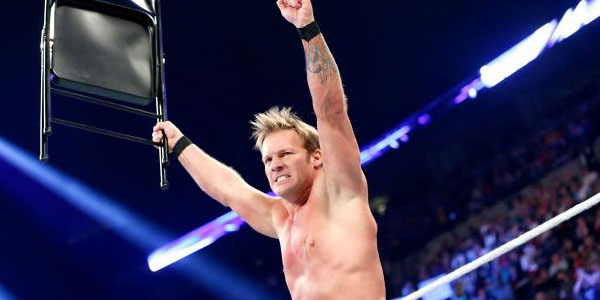
A commonly cited rule in professional wrestling worldwide, and especially in the WWE (where Michael Cole seems to feel the need to remind us of it on a weekly basis), this is the conceit that allows champions to retain the title if defeated by means of a count out or a disqualification. The idea originated in the National Wrestling Alliance territories, in order to assist heel champions in keeping the gold about their waists. In those days, a champion entering into a non-title match would have been more or less unthinkable. Untelevised matches before live crowds would follow the same patterns over and over, as the next town on the schedule wouldn't know the outcome of the card at the previous town. With a heel NWA champion entering local territories to be challenged by their top men, it made sense for there to be a way for the recognised champion to keep the title when they left again, but in a manner that allowed the local hero to look good: to appear as though he could have taken the title if circumstances hadn't conspired against him. The bad guy could cheat to win, or simply walk out on the match, scoring real heat with the crowd and retaining the title to do the same thing elsewhere. In the twenty-first century however, the champion's advantage no longer has this cache. Many televised matches involving the holder of a championship are specifically designated non-title matches, in order to allow the champion to be decisively beaten by a strong challenger and set up a title match at a pay-per-view. Given the number of gimmicked main events that crowd pay-per-views and special events where the title is on the line, most of which include a default "no disqualification" stipulation anyway, one questions the importance of the championship advantage in 2014.
9. Tag Rules In Lucha Libre
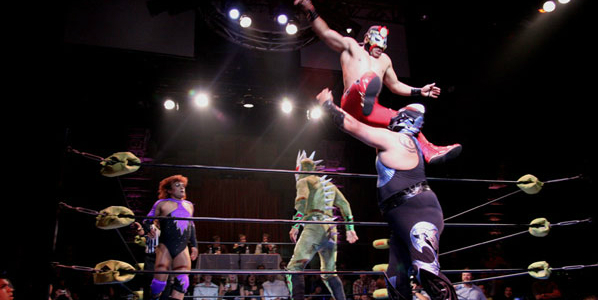
Mexican lucha libre is distinct from its North American counterpart in many different ways, and one of the most overlooked is the prevalence of tag team wrestling south of the border. Lucha libre will utilise three-man teams more often than it will the more traditional two-man team, with wrestlers competing in trios matches, the objective being to pin either the opposing team's captain, or both of the other members of the opposing team. Tag matches will have a completely different structure in Mexico, largely because the tagging rules are significantly different: tagging isn't always necessary at all, in fact. The legal man can leave the ring at any point, allowing another member of his team to immediately take his place. A second referee will be placed outside the ring to enable the officials to control this kind of action more effectively. This removes a good deal of the drama of the traditional Western tag match, the "hot tag" becomes less of a cliche, and the action doesn't spill out of the ring quite as often, but allows for a much more frenetic pace, something that's a staple of lucha libre. Whether it's something you prefer will often depend on what you're used to: it can be quite a culture shock for people unused to lucha libre.
8. Three Strikes And You're Out
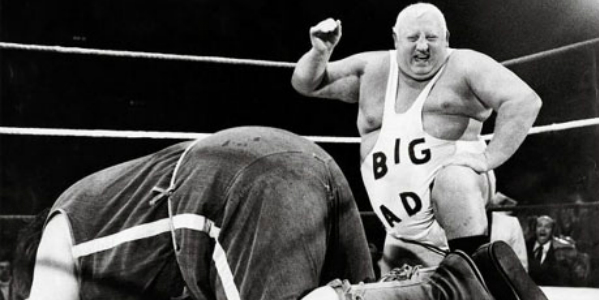
In the 1940s, professional wrestling was in the process of being scrutinised by local councils across the length and breadth of Britain, and had already been banned in London, due to the lawless and bloody nature of the "all-in" style that predominated at the time. Admiral-Lord Mountevans chaired a committee to revamp the rules, leading to the revitalisation of the sport in England leading into the second half of the 20th century. One of the staple rules of the new wave was the public warning, something that would become vital to the success of the business. Essentially, with the new rules strictly enforced by the referee, anyone caught committing an infraction was given a warning, like a yellow card in football. Two public warnings, and the crowd knew that the wrestler was only one away from being disqualified and losing the match. The system was a fantastic success, building tension and drama throughout a wrestling match while maintaining the appearance of a real sporting contest with strictly observed rules. The slightest offence would cause punishment, from a strike with a closed fist to an attack after the bell had rung to end a round. A bad guy that managed to trick the referee into giving a public warning to a blue-eye (babyface) opponent would get heat from the crowd like you wouldn't believe. The slower, more methodical and grappling-based style prevalent at the time made the public warning system invaluable in building a match with crowds. Whether it could ever work in the far more elastic world of today's professional wrestling, in which referees interpret the rules as loosely as they wish to achieve the desired outcome, remains to be seen.
7. Escaping The Cage
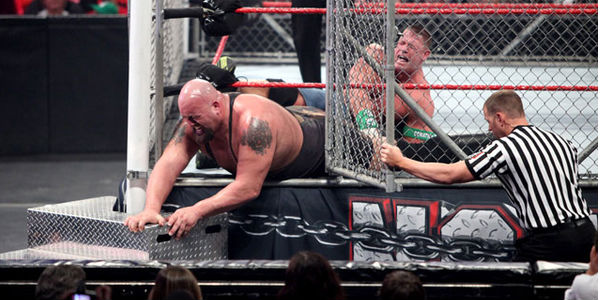
Back in the old days, before every big match needed a stipulation or a gimmick to draw, the cage match was your feud defining blow-off, where the slippery heel was trapped with no way to escape, no way for their villainous confederates to interfere. Finally, the heroic babyface had the bad guy just where he wanted him. Cage matches were massive draws, on television and as live spectaculars. But, as with many other aspects of professional wrestling, the arrival of regular national exposure screwed the pooch for the humble cage match. Promotions (specifically, WWF/E and WCW) were forced to up the ante to compete with one another. The cages got bigger, gained roofs, spikes, pods. One cage became two, or more. There was fire! Blood! Rains of fish from the skies! Okay, perhaps not that last one. Not yet, anyway. Of course, people rarely stop to wonder why, if the cage gimmick was to allow the put-upon babyface to get the cowardly cheating heel all to himself, why one of the rules for winning is for a competitor to escape? Yes, why is that? How does that work? You've stunned and horrified the bad guy by declaring that your next match will be contested INSIDE A STEEL CAGE, and in the next breath informed him that, despite being trapped and destined to be whipped like a government mule (copyright Jim Ross, 1999), he can still win if he manages to get out of the cage. In other words, if the gimmick introduced to prevent you from cheating proves unsuccessful, you can legitimately win. As rules go, this makes less sense than a sign language interpreter in handcuffs.
6. Removing The Mask
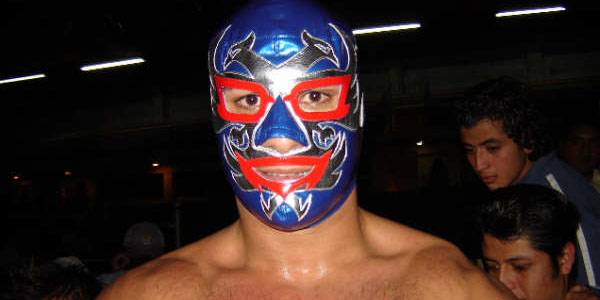
The mask has a cultural and historical significance in Mexico that it just doesn't have anywhere else. Luchadors with individually decorated masks will often have them decorated to reflect the archetype that they intend to represent through their gimmick and character. Often, masked luchadors from the old school will keep their masks on in public, maintaining character at all times. Many are of the opinion that the power of the mask in lucha libre is one of the last bastions of true kayfabe left in the world (unless you count Arn "Poker Face" Anderson). That's why it's illegal to attempt to remove your opponent's mask in Mexican wrestling, and will automatically result in a disqualification. Some promotions in Japan also run this particular rule, Japanese culture having a similar respect for the totemic value of the mask. Where American wrestling developed the cage match as the ultimate blow-off to a feud, lucha libre's equivalent is the lucha de apuestas, or "wager match", where combatants are so committed to settling their differences once and for all that they'll bet their mask on it (or, if already working without a mask, their hair). Such a gimmick would never work in US pro wrestling, as the cultural dissonance is so huge, it's almost the equivalent of a "loser retires" match, something with serious consequences for the luchadors involved.
5. The Freebird Rule
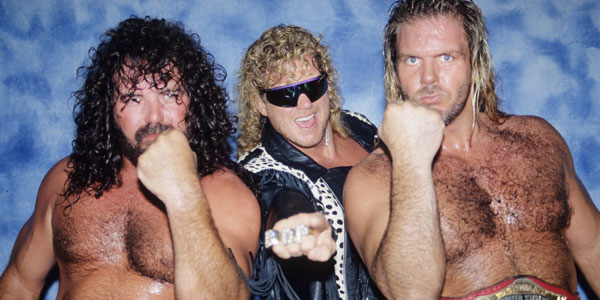
The Freebirds (Michael "P.S." Hayes, Terry "Bam Bam" Gordy and Buddy "Jack" Roberts) were put together by Bill Watts in a three-man stable, initially because of Watt's concern that Hayes wasn't a good enough worker to carry his half of a tag team. The match was one made in heaven, the Fabulous Freebirds tearing up Georgia Championship Wrestling in the early eighties before moving to World Class Championship Wrestling and having the feud of their careers versus the Von Erich boys. Of course, back in the day it wasn't often you'd see a team of more than two individuals. Opinions vary as to whether it was the Midnight Express or the Freebirds who innovated what would become known as the Freebird Rule but as the name makes clear, it was the Freebirds who would be credited with it. The gimmick was applied when the group won the NWA tag team championship, and it was decided that to add spice to their title defenses, any two of the three could compete on any night they chose (the third presumably staying at ringside holding their coats and spare change). The Freebird Rule proved so popular as a heatseeking device for stables that it's been used across America for more than thirty years. It's fairly surprising that The Shield, talked up as a group of equals (a "band of brothers") didn't follow the Rule when Rollins and Reigns won the WWE tag team championship. The Rule has also been adapted for use in other, slightly less successful contexts, such as when one member of a tag team wins a lower-ranked singles title, best remembered when Team Lay-Cool co-defended the WWE Diva's championship when Layla won the title, and later once again when Michelle McCool did likewise.
4. The Power Of Attorney Rule
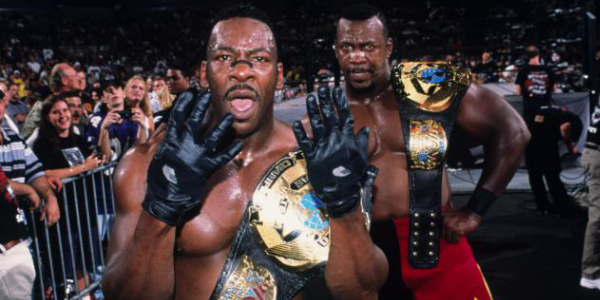
Similar to the Freebird Rule, but only ever utilised once, and with infinite booking possibilities, how this hasn't been co-opted into a WWE storyline since is an utter mystery. If anyone can recall this actually taking place, please let us know in the comments and we'll award you 100 IWC points. Harlem Heat were probably the tag team with the highest profile in WCW throughout the late nineties, holding the WCW tag team championships an incredible ten times before their split in 1999. In early 1998, older brother Stevie Ray was forced to take a few months off to rehab an injury to his ankle, and his partner Booker T would go on to significant singles success without him, winning the WCW World Television Championship (the only African American ever to do so). Later that year, the roles were reversed when Stevie Ray would return and his partner would be out with an injury of his own. Rather than have Booker vacate the title, it was decided that Stevie Ray would represent him and defend the championship due to "power of attorney" having been passed to him by his injured younger brother. Before finally dropping Booker's title to Chris Jericho on August 10th, Stevie Ray would successfully defend the WCW Television Championship (that he never actually won) eleven times, often through heelish application of the Champion's Advantage, being counted out twice and disqualified three times. It would be the biggest singles run of Stevie Ray's career. Imagine that rule applied to WWE today: what if Daniel Bryan, fresh from the greatest night of his career at Wrestlemania XXX and suddenly finding himself needing surgery, had responded to the Authority's condescending request to vacate the WWE World Heavyweight Championship by bringing in his lawyers and having a friend defend it for him? It could have made for some delicious television, as well as given someone like Cesaro or Ziggler a few weeks of action as a transitional champion in all but name, and their careers a rub in the process.
3. The Outlaw Rule
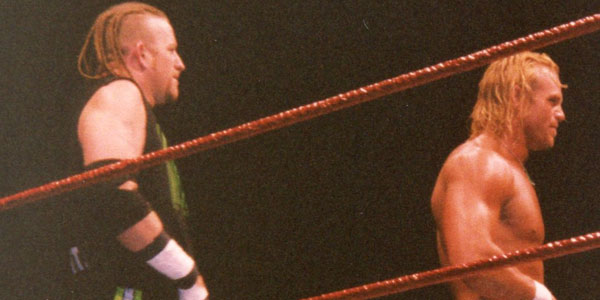
There are many and various rules relating to tag team wrestling in WWE. You have to be the legal man to win the match for your team. You have to be in your corner when you're tagged, preferably holding onto one of the short tag ropes so the referee can approve the tag. You've only got a small window to quickly double-team your opponent after tagging your partner. Oh yes, and you can't win the match by pinning your own tag team partner. That's known as the Outlaw Rule, brought in specifically to prevent what occurred on 8th June 1998 on Raw Is War from ever happening again. The New Age Outlaws were booked in a Triple Threat tag team match for their WWF Tag Team Championship against the Legion Of Doom 2000 and huge biker twins Skull and 8-Ball, half of the Disciples Of Apocalypse stable.* By the peculiar rules of the match, which had head writer Vince Russo's fingerprints all over it, only two people could be in the ring competing at once, but anyone could tag anyone else in, from any other team. The Outlaws did what D-Generation X always did back in the Attitude Era: messed around and played the fool, irritating their big, nasty opponents. Finally having had enough, the LOD and the DOA tagged in both the Road Dogg and Billy Gunn, who found themselves facing each other. Naturally, the duplicitous rogues didn't try to tag anyone else in, or actually face off: instead, the Road Dogg quickly lay down, Gunn pinned him for the three count, and then the two hightailed it out of the ring and away with D-X and their tag titles, the gang laughing hysterically. http://www.dailymotion.com/video/xrzwg8_raw-is-war-6-08-98-the-outlaws-vs-l-o-d-vs-d-o-a_sport. The following week, the announcers would confirm that the loophole had been closed, and that, regardless of any other rules, no tag team could pin each other to win a match. It's called the Outlaw Rule, in honour of the team who made it necessary. *Some pro-wrestling trivia for you: Brian "Chainz" Lee, another member of the DOA biker gang (who rode their bikes to the ring and wore leather and bandannas) had previously wrestled for WWF as the imposter Undertaker in 1994. Calaway would later return the favour and steal the DOA biker gimmick wholesale when he came back from injury in 2000 as the American Badass.
2. The 24/7 Rule

No one ever suffered from "little man" syndrome quite like the late Crash Holly. Billing himself as a "super heavyweight", he was always attempting to prove to his larger, meaner storyline cousin Hardcore Holly that he was as tough as he was, never more so than when he won the WWF Hardcore Championship from the enormous Test in February 2000. Trying to separate himself from the pack, Crash declared himself the greatest Hardcore Champion of all time and vowed to defend the title 24 hours a day, 7 days a week, 365 days a year. Basically, any time, any place, anywhere. Holly would end up defending his title in all manner of places: while asleep in his hotel, at the airport, the circus, an amusement park, while taking a massage, and against all manner of people, anyone really, as long as they could drag a referee along to count the pin. On one memorable occasion, the referee himself threw off his shirt and tried his luck at pinning the champion. Crash would often be pinned, but immediately regain the title again under the same rule. Altogether, "the Houdini of Hardcore" would have 22 WWF Hardcore Championship reigns under the 24/7 Rule. http://www.dailymotion.com/video/x9uvxr_crash-holly-defends-hardcore-title_sport